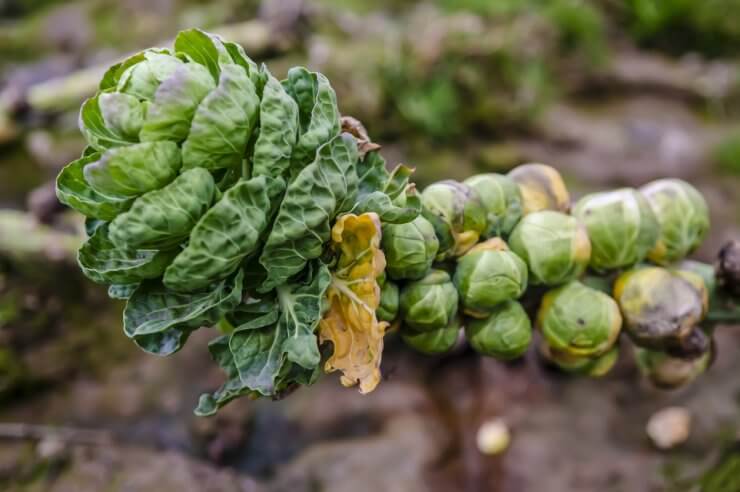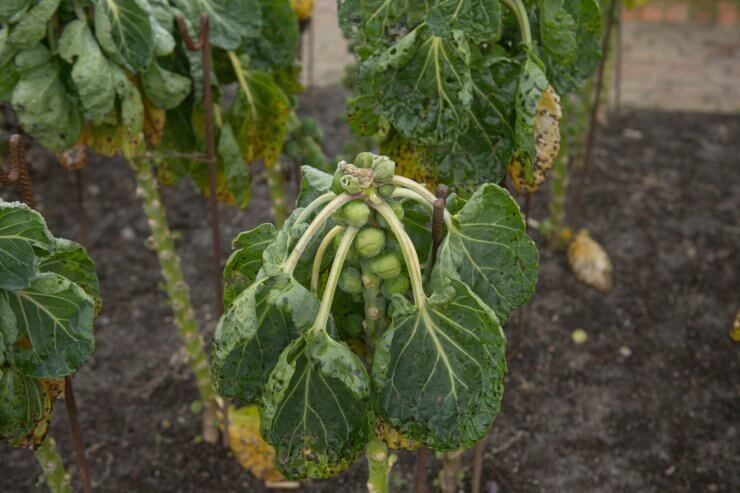
Brussels Sprout plant afflicted with disease
Brussels sprout plants can fall victim to a number of diseases, including black rot, downy mildew, and alternaria. Some of these diseases can persist in the soil and require that you conscientiously rotate your crops to prevent future infections. Some diseases can remain a threat in the ground for up to nine years!
Spot diseases on your Brussels sprout plants sooner so you can treat plants before they are destroyed by disease and can successfully manage symptoms. Here is a three-step approach to keeping vigilant about the presence of Brussels sprout plant diseases:
- Research the Risks. Find out about Brussels sprout diseases that are prevalent in your geographic area. When possible, buy disease-resistant Brussels sprout plant varieties to avoid diseases in the first place—many hybrid Brussels sprout varieties have been specifically designed to resist certain diseases.
- Check Your Plants Daily. Check your Brussels sprout plants every day to be sure no disease symptoms are present or emerging.
- Spot Diseases Early. Catch and treat disease quickly so your plants can recover and thrive.
Here are some of the diseases that can affect your Brussels sprout plants. Most of the time, the signs of disease will show up on the leaves.
- caused by fungus after warm summer rain, with temperatures between 65 to 75 degrees F
- small black dots appear on leaves, most obvious on the underside
- spots enlarge as disease progresses, forming a bull’s eye pattern
- leaves turn yellow between the infected spots
- will not kill the plant, but can significantly weaken it
- more than 12 hours of warm rain can distribute spores so much that the plant cannot recover
Treatment: Cut off affected leaves and destroy them. Alternately, discard them. Do not dig them into the soil. Removing affected leaves will reduce the number of spores and improve air circulation around the plant.
Prevention: Buy disease-free seeds; do not save seeds from infected plants. Make sure plants have good air circulation and get plenty of sun. Avoid using sprinklers; water at soil level. At the end of the season, compost or destroy all plant material, even if it shows no current sign of infection.
Brassica Black Rot:
- caused by bacteria
- irregular V-shaped yellow and brown patches appear on leaves
- leaves turn yellow; veins turn brown or black
- plant may appear lopsided as infection spreads
- can kill seedlings
Treatment: Pull up plants and destroy them. Never dig diseased plants back into the soil; the bacteria can persist in the soil for up to two years.
Prevention: Buy disease-free seeds; choose disease-resistant varieties. Prevent the buildup of black rot bacteria by rotating your crops; do not plant brassicas in the same area two years in a row.
Brassica Downy Mildew:
- caused by fungus after a prolonged period of damp weather with a temperature between 50 to 60 degrees F
- causes light green irregular spots on leaves; spots quickly turn brown and increase in number
- spots look damp and often merge
- fuzzy mold may be visible on underside of leaves
- infection can open plant to other damaging microorganisms
Treatment: Cut off and discard affected leaves. As weather dries out, plant should produce new leaves.
Prevention: Choose disease-resistant varieties. Avoid using sprinklers, which trap moisture. Use mulch to keep soil from splashing on plants in heavy rain; this may transfer the fungus to the leaves. Make sure plants get good air circulation and lots of sun. Keep weeds under control.
Club Root:
- caused by a soil-borne fungal infection of the roots
- causes swollen and distorted roots and stunted growth
- leaves may yellow and wither</li
Treatment: Adjust soil pH to 6.8 by adding ground limestone.
Prevention: Choose disease-resistant varieties. Add lime to soil before planting. Test soil before planting. Rotate out all cruciferous vegetables for at least seven years.
Make your own natural disease and pest control spray with benign materials. Mix one tablespoon of baking soda, 1/2 teaspoon of a mild dish detergent, and 2 1/2 tablespoons of olive oil in a gallon of water to make a solution that will repel all kinds of bugs and act as a fungicide mildew on Brussels sprout plant leaves. Shake it well in your bottle before spraying and repeat every week for it to be continuously effective.
We’re believers in not using toxic materials in the garden—they can hurt the plants, hurt the soil, damage the environment, and harm you.

Signs of Brassica Alternaria Leaf Spot on a Brussels sprout plant
Brassica Alternaria Leaf Spot:
Preventive measures to avoid Brussels sprout plant diseases
Try some of these techniques for avoiding Brussels sprout diseases in the first place:
Rotate crops regularly
Many bacteria, fungi, and viruses live in the soil for years and are just waiting to prey on your Brussels sprout plants! Minimize the likelihood of these diseases when you plant Brussels sprouts by planting no more than once every two to three years in the same location.
Avoid planting other Brassica crops nearby, such as cabbage, broccoli, and kale. As members of the same plant family as Brussels sprouts, these crops are susceptible to the same diseases as Brussels sprouts; having them nearby could facilitate rapid spread of any developing disease.
Improve your soil composition
Before planting your Brussels sprouts, add a good amount of compost or organic matter to improve the soil. Extra nutrients and good aeration help grow stronger plants that will resist disease and infection.
Plant disease-resistant Brussels sprout varieties
Many hybrid Brussels sprout varieties have been developed specifically to resist particular Brussels sprout diseases. Plant disease-resistant Brussels sprout varieties so you can have the healthiest plants and harvest. Check with your garden center or check the seed information before you choose a variety to plant.
Water your garden properly
Don’t underwater or overwater your Brussels sprout plants. By keeping a regular watering schedule, you’ll keep your plants vibrant and healthy. Overwatering and watering directly on the plants—instead of the preferred watering method, directly at the stem on the soil—leads to consistently wet conditions, which allows bacteria, fungi, and viruses to thrive and multiply.
Destroy infected plants
Throw away or burn infected plants. Don’t keep infected plants over the winter in your garden, and don’t throw them on your compost pile. Disease-ridden plants, even when dead, will spread the disease to other plants or even your soil. Some gardeners will tell you it’s OK to compost your fungus-infected leaves, as long as they decompose completely. But it’s probably not worth the risk to your garden.
Have you had problems with diseases attacking your Brussels sprout plants? What types of problems do you regularly face with your Brussels sprouts? Please tell us how you treat and prevent diseases for destroying your Brussels sprout crop.


 Previous
Previous


Aphids on Brasica veggies seem to be the Vilain in my garden. Other than spraying with strong water jets, what is a good deterrent?
Great question Mara. Please check out our article “What to do about Pests that can Harm Your Brussels Sprouts Plants.”
There are a few suggestions that might work for you. One option is to attract pest predators – ladybugs love aphids. Another option is to include trap plants in your garden to draw pests away from your crops – aphids love nasturtiums. You could also try planting chives near your brassicas – aphids hate chives.
You can also try making a DIY pest spray. Here’s an excerpt from the article mentioned above. “Mix one tablespoon of baking soda, 1/2 teaspoon of a mild dish detergent, and 2 1/2 tablespoons of olive oil in a gallon of water to make a solution that will repel all kinds of bugs, as well as a fungicide for blight and mildew on the Brussels sprout plant leaves. Shake it well in your bottle before spraying and repeat every week for it to be continuously effective.”